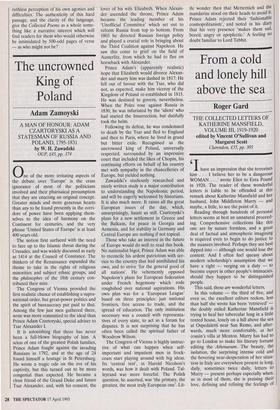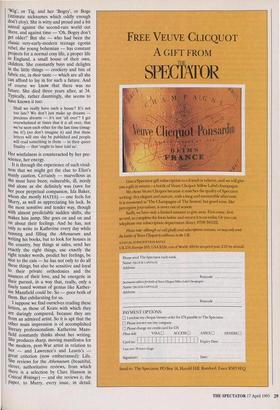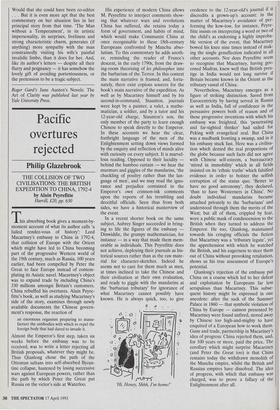From a cold and lonely hill above the sea
Roger Gard
THE COLLECTED LE1 1 FRS OF KATHERINE MANSFIELD, VOLUME III, 1919-1920 edited by Vincent O'Sullivan and Margaret Scott Clarendon, f35, pp. 305 Ihave an impression that she terrorises him . . . I believe her to be a dangerous WOMAN . . .' wrote Eliot to Ezra Pound in 1920. The reader of these wonderful letters is liable to be offended at this remark about Katherine Mansfield and her husband, John Middleton Murry — and maybe, a little, to see the point of it. Reading through hundreds of personal letters seems at best an unnatural proceed- ing. Comprehensive collections like this one are by nature formless, and a great deal of factual and atmospheric imagining is required even to begin to do justice to the nuances involved. Perhaps they are best dipped into — although one would lose the context. And I often feel queasy about modern scholarship's assumption that we have a right — verging on a duty — to become expert in other people's intimacies, should they happen to be distinguished people.
This said, these are wonderful letters.
In this volume — the third of five, and even so, the excellent editors reckon, less than half she wrote has been 'retrieved' the doubly exiled Katherine Mansfield is trying to heal her tubercular lung in a little rented house, lonely on a hill above the sea at Ospedaletti near San Remo, and after- wards, much more comfortably, at her cousin's villa at Menton. Murry has had to go to London to make his literary fortune editing the Athenaeum. The beauty, the isolation, the surprising intense cold and the hovering near-desperation of her situa- tion in Italy are everywhere present in long, daily, sometimes twice daily, letters to Murry — present perhaps especially when, as in most of them, she is praising their love, defining and refining the feelings of Wig', or Tig, and her 'Bogey', or Boge (intimate nicknames which oddly enough don't cloy). She is witty and proud and a bit unreal against the second-rate world out there, and against time — 'Oh, Bogey don't get older!' But she — who had been the classic very-early-modern teenage egotist rebel, the young bohemian — has constant projects for a normal cosy life, a proper life In England, a small house of their own, children. She constantly buys and delights in the little things — crockery and bits of fabric etc, in their taste — which are all she can afford to lay in for such a future. And of course we know that there was no future. She died three years after, at 34. Typically, rather dauntingly, she seems to have known it too: Shall we really have such a house? It's not too late? We don't just make up dreams precious dreams — it's not 'all over'? I get overwhelmed at times that it is all over, that we've seen each other for the last time (imag- ine it!) (no don't imagine it) and that these letters will one day be published and people will read something in them — in their queer finality — that 'ought to have told us'.
Her wistfulness is counteracted by her pre- science, her energy.
It is through the experience of such vivid- ness that we might get the clue to Eliot's manly caution. Certainly — marvellous as she must have been; vulnerable, ill, needy and alone as she definitely was (save for her poor perpetual companion, Ida Baker, Whom she mostly HATES) — one feels for Murry, as well as appreciating his luck. In the most sensitive and tender way, though with almost predictable sudden shifts, she Makes him jump. She goes on and on and on about their feelings. And he has, not only to write to Katherine every day while running and filling the Athenaeum and Writing his books, but to look for houses in the country, buy things at sales, send her exactly the right things, use exactly the right tender words, predict her feelings, be nice to the cats — he has not only to do all these things, but also be sensitive and loyal to their private orthodoxies and the nuances of their love, and be energetic in their pursuit, in a way that, really, only a finely tuned woman of genius like Kather- ine Mansfield could be. So — poor both of them. But exhilarating for us.
I suppose we find ourselves reading these letters, as those of Keats with which they are daringly compared, because they are from an admired artist. So it is apt that the other main impression is of accomplished literary professionalism. Katherine Mans- field constantly thinks about her writing. She produces sharp, moving manifestos for the modern, post-War artist in relation to her — and Lawrence's and Leavis's great criterion (now embarrassed): Life. She reviews for the Athenaeum (beautiful, Clever, authoritative reviews, from which there is a selection by Clare Hanson in Critical Writings) — and she reviews it, the Paper, to Murry, every issue, in detail. Would that she could have been co-editor . . . But it is even more apt that the best commentary on her situation lies in her principal story from that time. 'The Man without a Temperament', in its artistic impersonality, its surprises, liveliness and strong characteristic charm, generates (if anything) more sympathy with the man constrainedly visiting his wife's painful invalidic limbo, than it does for her. And, like its author's letters — despite all their flurry and poignancy — it has somehow the lovely gift of avoiding portentousness, or the pretension to be a tragic subject.
Roger Gard's Jane Austen's Novels: The Art of Clarity was published last year by Yale University Press.




















































 Previous page
Previous page